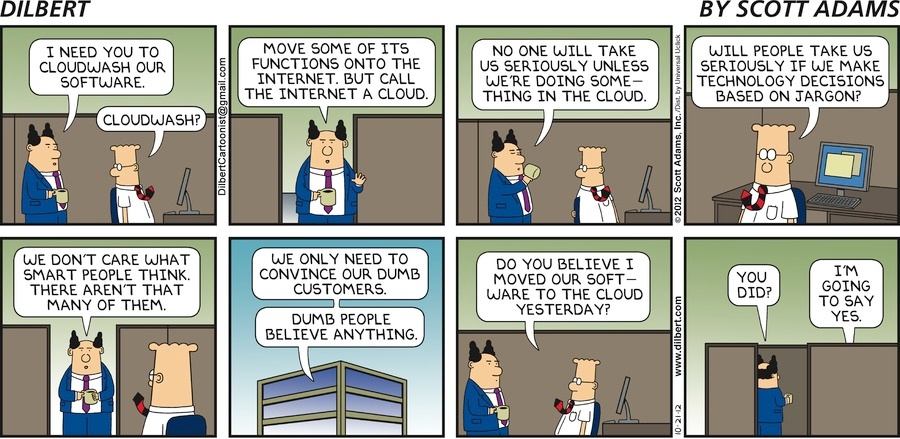Advertisers love buzzwords. But nowhere are they more ubiquitous – or misleading – than on food labels, as that industry looks to adopt fast growing market trends for healthy foods.
Just as consumers navigate grocery aisles filled with products making dubious health claims, so too are companies faced with an ever increasing supply of services and products inaccurately branded as “cloud.” It’s a phenomenon known as cloud-washing.
Tech Target defines cloud-washing as “the purposeful and sometimes deceptive attempt by a vendor to rebrand an old product or service by associating the buzzword ‘cloud’ with it.”
To understand marketers’ motivations, the food labeling analogy again proves useful. Consumers associate positive qualities like losing weight and lowering risk of stroke with healthy foods. Likewise, they rightly connect legitimate cloud computing with benefits including lower costs, ease of use and scalability.
Unfortunately, the inability to distinguish healthy food from processed garbage, and a real cloud provider from the imposters, is when consumers’ informed decision-making ends and misleading marketing begins.
Who gets fooled?
Think the only type of victim to be duped by cloud-washing is your computer illiterate aunt looking to share family photos? Think again. A 2014 study by the European Union found that the majority of businesses not yet using the cloud cited a lack of knowledge as the main factor preventing them from using it. In other words, an easy way for cloud-washing vendors to capitalize.
Like any emerging technology, the greatest hurdle towards adoption is a lack of understanding of the technology itself. This puts both consumers and SMBs at risk, with negative ramifications for the entire industry.
The cloud – not just a buzzword
The cloud does have all the hallmarks of a buzzword – a word or phrase that is fashionable at a particular time, and often confused with software-as-a-service. But it also very real, representing one of the most significant changes in the market for computing infrastructure and services since the advent of the internet itself.
A cloud must exhibit five essential characteristics: on-demand self-service, broad network access, resource pooling, rapid elasticity or expansion, and measured service. Offerings from several tech titans do not meet these criteria.
Research indicates that many businesses have a far broader interpretation of what constitutes cloud computing. What it boils down to, writes CloudOps CEO Ian Rae, is that the “fundamental innovation of cloud computing is often overlooked - to be able to use what you need, when you need it.”
Take hosted services. While often packaged as “cloud” by vendors, upon closer inspection, they don’t fit the bill. Infrastructure hosting services are designed for users with relatively stable requirements. Scalability and agility – two hallmarks of cloud computing – may be impossible in the short-run, and prohibitively expensive in the long-run.
Likewise, virtual private servers are often confused as cloud computing. Again, we see them lacking the scalability of a true cloud solution. Instead of quick deployment of resources on an as needed basis, VPS users will have to manually request additional resources from a finite pool they share with other users.
One high-profile cloud washing offender is Oracle and its CEO Larry Ellison. The outspoken executive had slammed cloud computing as a fad, but in a stunning about face, launched the Oracle Exalogic Elastic Cloud. The product itself was just an Oracle rehash in cloud packing, leading Information Week to scoff that it’s “a name that contains so many contradictions of the definition of cloud computing that it threatens to render the term meaningless.”
Conclusion
Why are seemingly well informed enterprises buying into cloud-washing? Because in some cases, they don’t want a true cloud solution, citing a number of concerns including security fears. Just as an “all-natural” label may give customers the validation to buy a sugary cereal, purchasing cloud-washed services allows executives to confidently place the cloud on their corporate roadmap and appear forward thinking.
For vendors offering legitimate cloud solutions, great care must be placed in being transparent about the capabilities and benefits of their offerings, while also assuaging existing fears about the cloud.
As the IT industry continues to evolve, we need to make sure “the cloud” does not occupy the same space as “all-natural, gluten free” in the mind of an increasingly cynical public.
Contact us to find out more about Canada's true cloud infrastructure.
Image credit: http://dilbert.com/strip/2012-10-21




